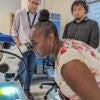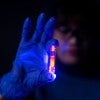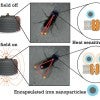
Rice University today introduced the Rice Biotech Launch Pad, a Houston-based accelerator focused on expediting the translation of the university’s health and medical technology discoveries into cures.

Rice University today introduced the Rice Biotech Launch Pad, a Houston-based accelerator focused on expediting the translation of the university’s health and medical technology discoveries into cures.

US Sen. Cornyn’s staff visits Rice
Alaura Ervin, legislative assistant for U.S. Sen. John Cornyn, toured several Rice Neuroengineering Initiative labs and the Ion Aug. 23, learning about the ways Rice is strengthening the workforce. (Photos by Nathan Cook)

Tiny, flexible spinal probe system could lead to better therapies
A $6.25 million National Institutes of Health grant supports Rice U. engineers optimizing a neural probe array that can record the activity of spinal cord neurons as bodies move and behave. Scientists would also develop an integrated data-processing and stimulation-feedback system.

Four Rice undergraduates latest Owls to win coveted Goldwater Scholarship
Rising Rice seniors Maria Hancu, Alex Lin, Ryan Wang and Ruofeng “Charlie” Liu are the latest Owls to win the coveted Goldwater Scholarship, one of the most prestigious honors bestowed each year upon pioneering STEM undergraduates across the country planning to pursue doctoral degrees.

NIH grant backs study focused on Alzheimer’s in women
Rice University postdoctoral fellow Hannah Ballard has won a three-year grant from the National Institutes of Health to investigate the link between the transition to menopause and Alzheimer’s disease.

Flexible nanoelectrodes can provide fine-grained brain stimulation
Rice University engineers have developed ultraflexible implantable nanoelectrodes that can administer long-term, fine-grained brain stimulation.

Neuroengineering’s InterfaceRice 2023 conference draws 160-plus
More than 160 leaders in neurotechnology, neuroscience, neuroengineering and neurosurgery attended InterfaceRice 2023, the inaugural conference of the Rice Neuroengineering Initiative, May 18-19.

Rice U.’s Taiyun Chi wins NSF CAREER Award
Taiyun Chi, an assistant professor of electrical and computer engineering at Rice University, has won a prestigious National Science Foundation CAREER Award to research the development of a high-performance neural interface and a noninvasive deep-brain-stimulation system.

Rice scientists’ discovery could lead to new Alzheimer’s therapies
A new approach to the study of amyloid-beta, a peptide associated with Alzheimer’s disease, has led Rice University scientists to findings that could have a significant impact on the understanding and potential treatment of the disease.

New fluorescent dye can light up the brain
Rice chemist Han Xiao and Stanford researcher Zhen Cheng have developed a tool for noninvasive brain imaging that can help illuminate hard-to-access structures and processes. Their small-molecule dye is the first of its kind that can cross the blood-brain barrier, allowing researchers to differentiate between healthy brain tissue and a glioblastoma tumor in mice.

DARPA grant will fund hunt for drug that can keep people warm
Rice University bioengineer Jerzy Szablowski has won a prestigious DARPA Young Faculty Award to identify nongenetic drugs that can temporarily enhance the human body’s resilience to extreme cold exposure.

Rice funds new research collaborations with Houston Methodist
Rice and Houston Methodist have awarded seed grants for research in robotics, imaging, cardiovascular bioengineering, and psychological and behavioral health.

Rice bioengineer seeks better signals from cells
Jerzy Szablowski earns NIH support to research noninvasive reporters that monitor gene therapy in the brain.

Engineers explore the source of dreams and thoughts
Rice neuroengineers created a 3D electrode array that can identify up to 1 million potential synapses in the brain.

Wireless activation of targeted brain circuits in less than one second
Rice neuroengineers and collaborators have created wireless technology to remotely activate brain circuits.